Trending
Monday June 9, 2025
Trending
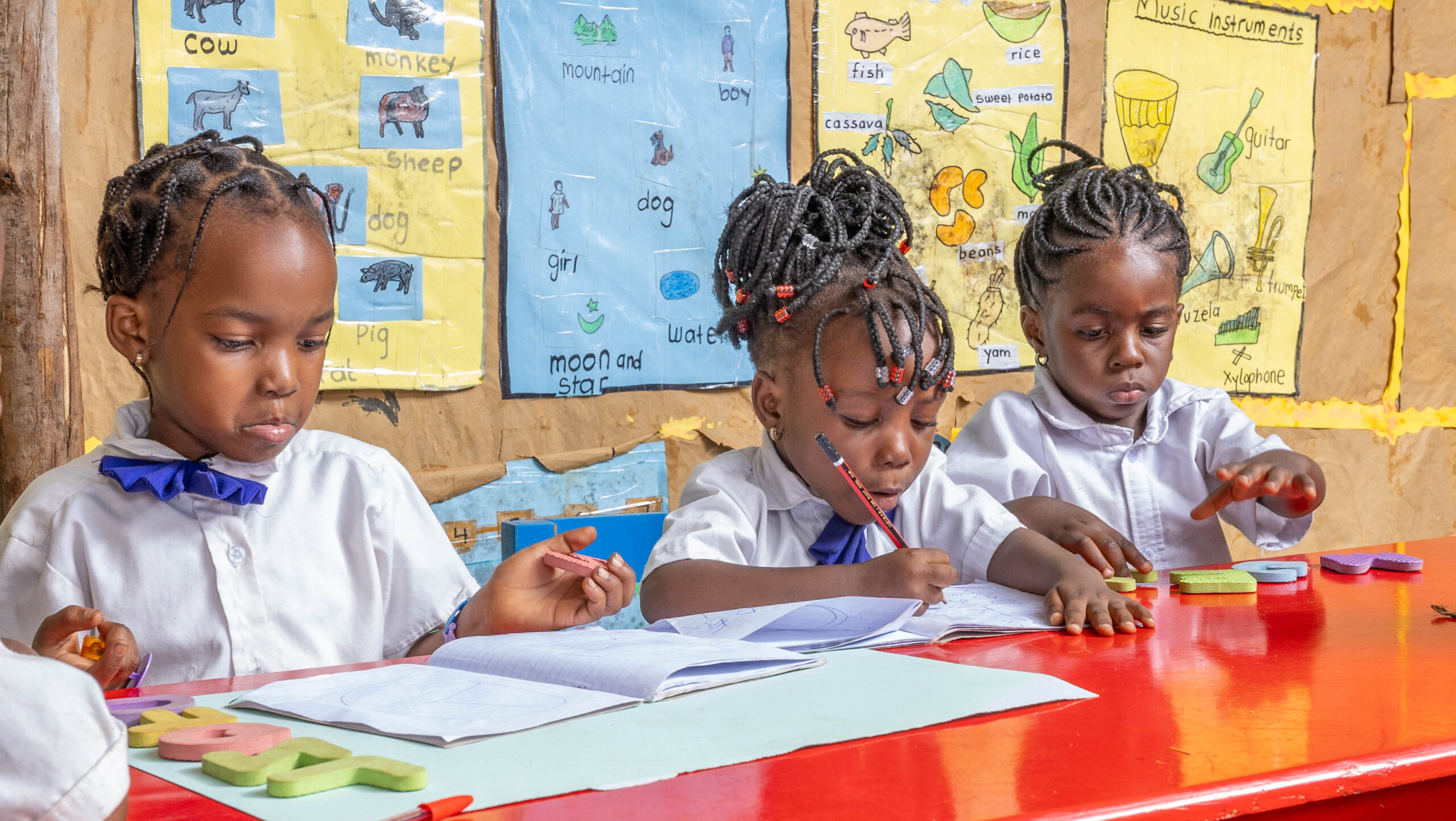
By: Rhonet Atwiine
It’s a hot afternoon in Katwe, a suburb of Uganda’s capital, Kampala. Sunlight spills through the windows of a classroom where a group of young teenage girls sit, their eyes glued to the blackboard. Their teacher moves across the room, explaining an arithmetic formula.
In the middle of the class is 14-year-old Justine Bigirimana, a science student who dreams of becoming a doctor. She’s one of the many Congolese girls embracing new opportunities through education—opportunities made possible by the freedom to move and learn across African borders.
“In the future, I want to work in the biggest hospitals and save lives. After my studies, I hope to return to my country, share what I have learned, and inspire other girls to pursue their dreams,” she says confidently.
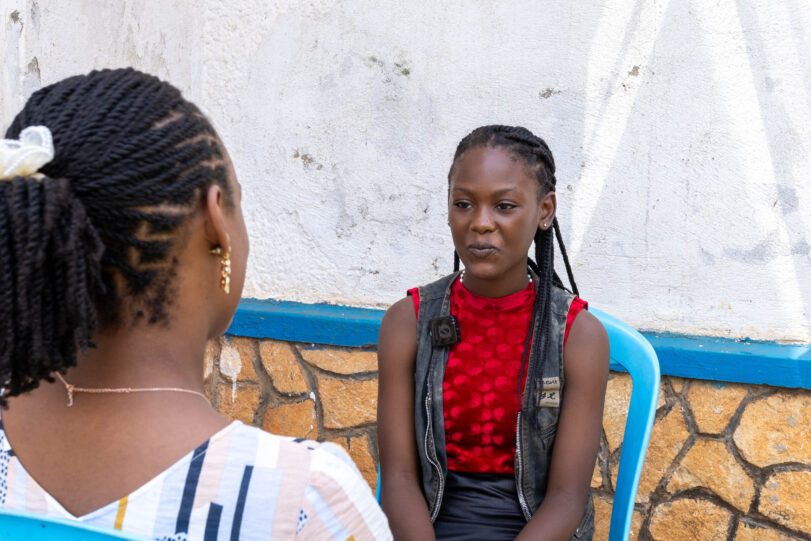 Justine Bigirimana, a student at Complexe Scolaire Katwe, during an interview. Photo: Akram Ndawula
Justine Bigirimana, a student at Complexe Scolaire Katwe, during an interview. Photo: Akram Ndawula
Bigirimana is a student at Complexe Scolaire Katwe, a learning center created exclusively for Congolese girls by Congolese educators in Uganda. It was founded in 2016 with one goal: to ensure Congolese girls who move across borders in search of safety and opportunity don’t lose access to education.
Like many of her classmates, Bigirimana arrived in Uganda as a young girl, 7 years old, after the M-23 rebels invaded her village. While the journey brought uncertainties like a language barrier, it also opened doors. In Uganda, she found a school that spoke her language.
Unlike traditional schools in Uganda, which use English and Luganda as the language of instruction, this school teaches French, Lingala, and Swahili, while integrating English and elements of Uganda’s curriculum to support seamless transitions and cross-cultural understanding.
“Walking into the classroom for the first time, I was nervous. Would I catch up? Would I fit in? I had forgotten so much. But then, the teacher started speaking in French, and suddenly, I felt something I hadn’t felt in so long, relief. For the first time since coming to Uganda, I truly felt at home,” says Bigirimana, her eyes shining.
Her story is part of a larger narrative unfolding across the continent—one where African girls are finding hope in movement, and mobility is building bridges between countries.
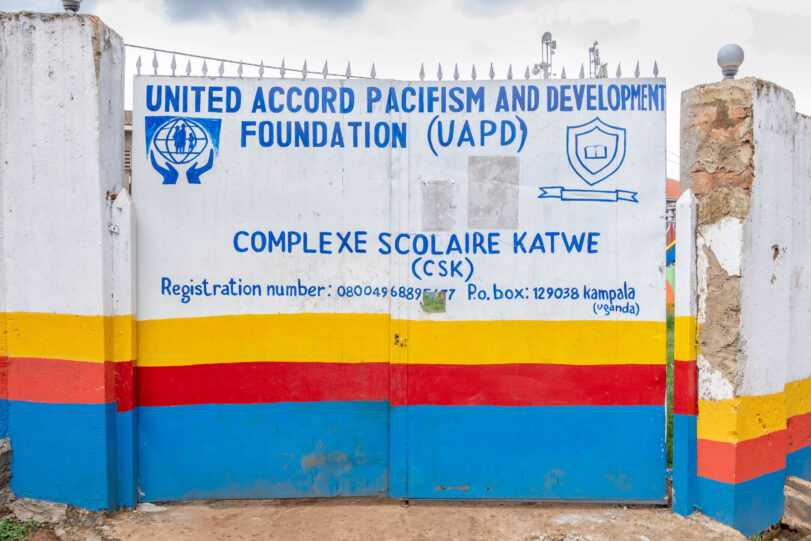 An entrance to Complexe Scolaire Katwe, a school dedicated to offering education to Congolese girls in Uganda. Photo: Akram Ndawula
An entrance to Complexe Scolaire Katwe, a school dedicated to offering education to Congolese girls in Uganda. Photo: Akram Ndawula
Globally, there are 32 million migrants, and Uganda hosts about 1.7 million of them, making it the largest migrant population-hosting country in Africa, according to the United Nations High Commissioner for Refugees (UNHCR).
Among these, 419,560 are girls of school-going age. Yet, for many, the promise of education remains just that—a promise.
UNHCR further reports that nearly half of all school-aged migrant girls are estimated to be out of school. According to the Uganda Bureau of Statistics (UBOS), only 49% of migrant girls complete primary school, while just 11% transition to secondary education.
Many of the migrants come from conflict-ridden countries such as South Sudan, the Democratic Republic of Congo, Somalia, Rwanda, Kenya, Eritrea, Ethiopia, Sudan, Burundi, among others.

Uganda provides migrant populations with certain rights, including the ability to work, move freely, access land, and use basic services such as healthcare and education. These provisions have allowed individuals like Bigirimana to adapt to life in a new environment.
This welcoming approach to migrant management is rooted in the Comprehensive Refugee Response Framework, which aligns with the principles of the Global Compact on Refugees. The key focus of this framework is the integration of migrant populations into the national development planning and statistics.
And schools like Complexe Scolaire Katwe are responding with both innovation and collaboration. It offers both primary and secondary education using the Congolese curriculum while embracing Uganda’s systems, preparing students to succeed anywhere they choose to go next, be it back home in Congo, in Uganda, or elsewhere on the continent.
“This school is more than a classroom. It’s a symbol of what’s possible when African countries open their doors to each other. We believe that science is science and math is math—no matter where you come from. So why should borders stop our girls from learning?” says Frank Fariji, the school’s headteacher and co-founder.
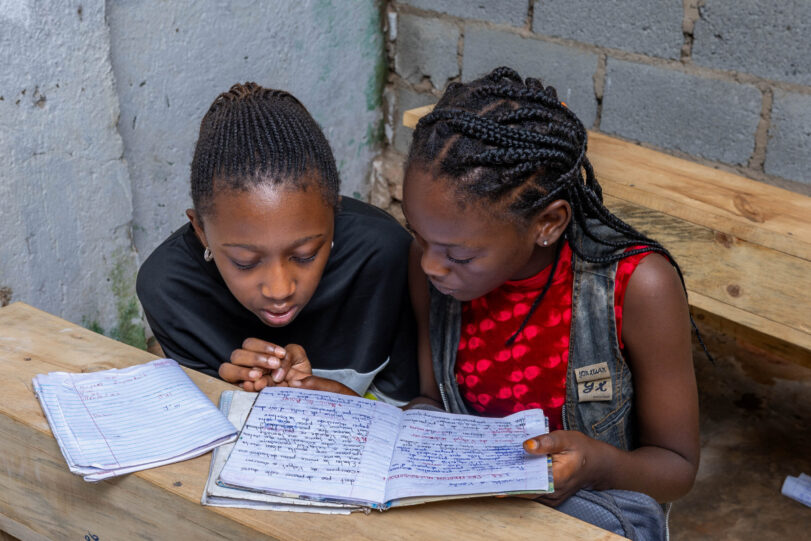 Justine Bigirimana (left) and Eunice Zawadi (right) exchange ideas during a chemistry discussion at Complexe Scolaire Katwe. Photo: Akram Ndawula
Justine Bigirimana (left) and Eunice Zawadi (right) exchange ideas during a chemistry discussion at Complexe Scolaire Katwe. Photo: Akram Ndawula
This approach is empowering a new generation of migrant girls who are building skills, exchanging ideas, and creating futures that transcend geography.
Across the continent, mobility has become a lifeline for girls seeking more than survival. It’s a path to self-determination. For 17-year-old Eunice Zawadi, who struggled to adjust in mainstream Ugandan schools due to language differences, the school offered a fresh start.
“I had stopped going to class because I couldn’t understand anything, because the teachers were using local languages to teach. But here, I’m learning in a language I understand, and I’m finally catching up,” she says with a smile.
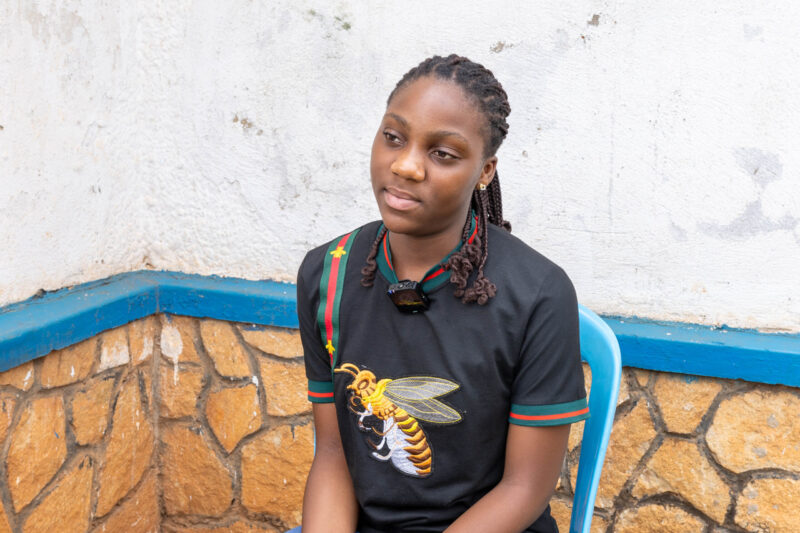 Eunice Zawadi, a student at Complexe Scolaire Katwe, during an interview. Photo: Akram Ndawula
Eunice Zawadi, a student at Complexe Scolaire Katwe, during an interview. Photo: Akram Ndawula
The school doesn’t just offer lessons—it offers protection. By keeping these girls in school, it helps delay early marriages and prevents child labor.
For many families, survival takes priority, and girls are often the first to be pulled out of school. Deep-rooted cultural beliefs play a role as well—many families prioritize boys’ education, assuming that girls will eventually marry and leave home.
But here the girls are connected with mentors, role models, and peers from across the region, building a sense of shared identity and resilience.
Arthur Mutombo, the school’s Dean of Studies, explains: “This education is deeply rooted in who we are as Congolese, but it also prepares our girls to participate in a broader African community. They can go anywhere, contribute meaningfully, and lead with confidence.”
Parents have noticed the change, too. Prosper Lukula, whose two daughters attend the school, says he’s proud to see his girls grow in an environment that respects their culture while preparing them for the world.
“This school gave my daughters a second chance, and they are excelling. One talks about becoming a lawyer, and the other, a journalist. This school has changed everything for us, but it also reminded me that Africa belongs to all of us,” he says.
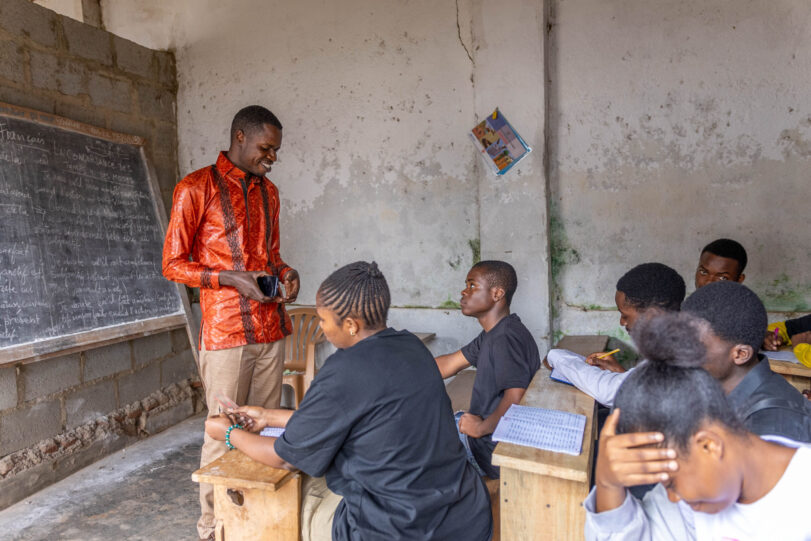 Frank Fariji, the headteacher and co-founder of Complexe Scolaire Katwe conducting an English lesson for three senior students. Photo: Akram Ndawula
Frank Fariji, the headteacher and co-founder of Complexe Scolaire Katwe conducting an English lesson for three senior students. Photo: Akram Ndawula
The mobility of African girls is creating spaces where cultures blend, ideas spark, and new dreams are born. Complexe Scolaire Katwe is one example of how freedom of movement empowers young girls to reclaim their futures, wherever they are.
While the school is based in Kampala, students are transported back to the Democratic Republic of Congo at the end of the school program to sit for national exams, typically at schools near the Congo-Uganda border.
This cross-border coordination ensures that students are assessed according to the DRC’s national curriculum and grading standards, keeping their academic progress formally recognized back home.
“After primary school, we enroll them into Junior Secondary (P.7 and P.8), which takes two years. This phase helps students identify and choose their preferred path—whether to continue with general education or opt for vocational training leading to a diploma or certificate,” Mutombo explains.
This approach not only supports educational continuity for migrant learners but also highlights the importance of collaboration between African nations. It shows how free movement policies—like those upheld by Uganda—can enable migrant students to access education while staying connected to their home country’s systems. It’s a working example of how regional cooperation can bridge educational gaps for migrant communities.
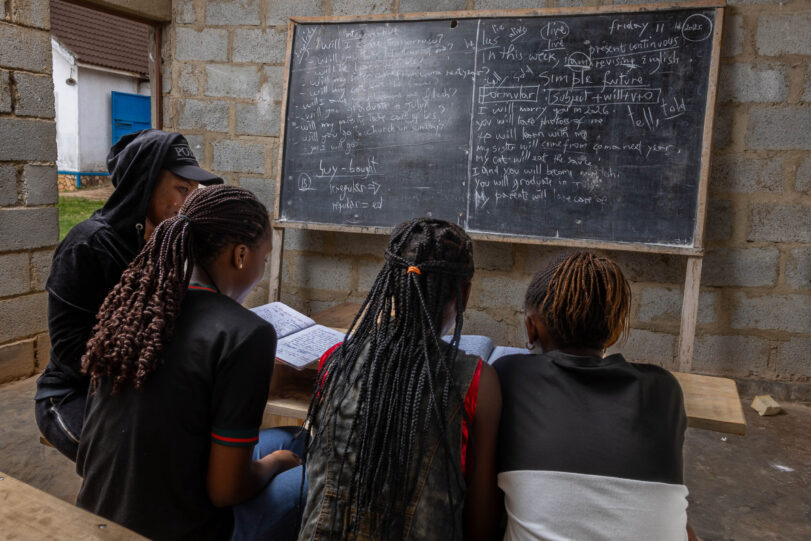 Students during a chemistry group discussion at Complexe Scolaire Katwe. Photo: Akram Ndawula
Students during a chemistry group discussion at Complexe Scolaire Katwe. Photo: Akram Ndawula
Beyond academics, the school places a strong emphasis on emotional and psychological support. Many of the students have experienced traumatic events, from the loss of family members to the horrors of war.
A small counseling program has been introduced, where students can talk to trained professionals about their experiences and health.
‘A problem shared is half solved. Here, we are not just teaching these girls. We are healing them. Every Friday evening, we gather to share our past experiences. Some cry, but over time, they begin to speak about them freely. When they feel safe and supported, they can dream again,” says Racheal Atim Okello, the teacher at the school.
“I have found my best friends here—people I can truly trust. We share everything and lift each other up. If I don’t understand something in class, I know my friend will explain it during group discussions or preps,” shares Racheal Burazimi, a primary four pupil at the school.
 Primary one pupils during literacy II class at Complexe Scolaire Katwe. Photo: Akram Ndawula
Primary one pupils during literacy II class at Complexe Scolaire Katwe. Photo: Akram Ndawula
In addition, the model equips girls with practical skills in crafts such as soap making, baking, catering, and creating items like bags, earrings, bangles, beaded bracelets, and baskets. These skills enable them to earn an income and support their families.
Beyond Uganda, these migrant students will carry their skills, experiences, and visions across the continent—whether it is by building hospitals in Congo, running media houses in Uganda, or starting businesses that connect African communities.
 Since its founding, the school has brought together and empowered over 400 girls through education and skills training. Its success has inspired similar initiatives across the country. Today, there are around five Congolese-led schools in Uganda, serving not only Congolese nationals but also other migrants from different countries.
Since its founding, the school has brought together and empowered over 400 girls through education and skills training. Its success has inspired similar initiatives across the country. Today, there are around five Congolese-led schools in Uganda, serving not only Congolese nationals but also other migrants from different countries.
As the sun sets over Katwe, the voices of girls echo through the school compound, voices filled with hope, ambition, and purpose.
For girls like Bigirimana, the chance to learn in a familiar language, in a safe space, has reignited dreams once thought lost. With books in hand and dreams in their hearts, these girls are not just surviving—they’re preparing to lead, create, and give back.
“I want to be a doctor, to save lives. I want to travel, learn, and come back to teach other girls that nothing is impossible,” she says.
In giving them a second chance, this school is shaping not only futures, but a stronger, more united Africa.
Disclaimer: “This content is produced as part of the Move Africa project, commissioned by the African Union Commission and supported by the Deutsche Gesellschaft für Internationale Zusammenarbeit (GIZ) GmbH. The views and opinions expressed are those of the authors only and do not necessarily reflect those of the GIZ or the African Union.”
We’re not gonna spam. We’ll try at least.

Copyright 2020. African Women In Media
Copyright 2020. African Women In Media
Recent Comments